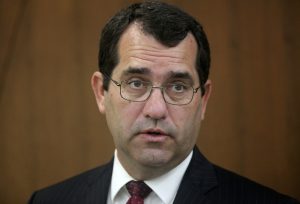Kansas legislators plan key votes on taxes, school funding
TOPEKA, Kan. (AP) — Some Republican legislators in Kansas are set to advance Democratic Gov. Laura Kelly’s plan to boost funding for public schools, while preparing to send her an income tax relief bill that could make it harder for the state to sustain the new spending.
The GOP-controlled Senate expected to vote Thursday on Kelly’s proposed education funding increase of roughly $90 million a year. Top Republican senators backed the plan as the most straight-forward fix, putting them at odds with conservatives who want new money tied to policy changes , including a voucher program to allow bullied students to move to new schools, public or private.
Kelly’s plan is designed to satisfy a Kansas Supreme Court order last year requiring legislators to increase the state’s education funding, currently at more than $4 billion a year. Attorneys for four local school districts that sued the state in 2010 are pressing for a larger increase and have had Democrats’ support, but top Republicans argue that even Kelly’s plan would be a financial stretch.
The Senate also expected to take a final vote Thursday on a bill pushed by GOP leaders and aimed at preventing individuals and businesses from paying higher state income taxes because of changes in federal tax laws at the end of 2017. Senate approval would send it to Kelly, who has said pursuing the bill repeats the failed fiscal policies under her Republican predecessors.
“We’re excited that they’re actually talking about school finance — that’s good,” said Lt. Gov. Lynn Rogers, a former Democratic state senator. “It’ll be difficult to balance the budget and repair the damage of the last years with the tax bill.”
Republican leaders see no contradiction in considering Kelly’s school funding plan and the tax relief bill at the same time. GOP lawmakers argue the tax bill heads off an unlegislated tax hike that would occur otherwise because the state and federal tax codes are tied. They also argue that tax relief will stimulate the economy.
“I hope we have a strong economy for a long time so we can afford the school funding bill,” said Senate President Susan Wagle, a conservative Wichita Republican, adding that the tax bill “keeps Kansas business-friendly.”
The House approved the tax bill last week after marrying its Senate-approved income tax measures to a cut in the state’s sales tax on groceries to 5.5 percent from 6.5 percent.
Wagle and other Republicans contend the income tax measures would merely keep Kansas from getting a “windfall” in revenues it isn’t collecting now. Kelly’s administration sees it differently, projecting that the state would give up $209 million during the budget year beginning in July, with much of the tax savings going to large businesses with operations outside the U.S.
Legislators in both parties expect Kelly to reject the bill. She has said repeatedly that legislators should “let the dust settle” on tax policy and focus on meeting the court mandate on schools.
The Supreme Court has ruled six times since 2013 that legislators weren’t fulfilling their duty under the Kansas Constitution to provide a suitable education for every child. A 2018 law phased in a $548 million increase in education funding by the 2022-23 school year, but the court ruled that it didn’t adequately account for inflation.









